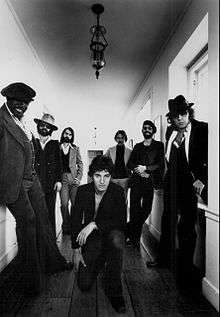Jersey Shore sound
The Jersey Shore sound is a genre of rock and roll popularized at the Jersey Shore on the Atlantic Ocean coast of New Jersey, United States.
| Jersey Shore sound | |
|---|---|
 Bruce Springsteen and the E Street Band popularized the Jersey Shore Sound | |
| Stylistic origins | |
| Cultural origins | Early 1960s, United States along the Jersey Shore |
| Derivative forms | |
| Other topics | |
| |
The Jersey Shore sound evolved from the mixing of pre-Beatles rock and roll, rhythm and blues, doo-wop, and the urban culture of the Mid-Atlantic states. The form has a strong Italian-American influence inasmuch as many of the form's key precursors and artists, from Frankie Valli through Bruce Springsteen, are of Italian ancestry and urban background.
Jersey Shore music shares two thematic elements with the genres of heartland rock and roots rock: A focus on the daily lives of people (in this case, those living in the stereotypically industrial society of the northeast United States, Northern and Central Jersey) and a sense of being the underdog (a theme in the genre from The Four Seasons' "Rag Doll", "Walk Like a Man", and "Big Man in Town" and through Springsteen's Dancing in the Dark).
Major artists
- Bruce Springsteen
- Southside Johnny and the Asbury Jukes
- Looking Glass
- Little Steven and the Disciples of Soul
Other artists
- Willy DeVille and Mink DeVille: The Willy DeVille bands of the early 1980s exhibited a pure Jersey Shore sound with accordions and a full-throated sax played by Louis Cortelezzi. Critics sometimes compared Mink DeVille's Coup de Grâce (1981) and Where Angels Fear to Tread (1983) to Springsteen and Southside Johnny. Allmusic said about Coup de Grâce, "The band's sound combined with Nitzsche's timeless production style, which combined with that voice to create a purer rock & roll noise than even Springsteen's in 1981."[1] Allmusic said about Where Angels Fear to Tread, "Why (Mink DeVille) didn't catch and George Thorogood and Southside Johnny (briefly) did is a mystery that will be up to '80s historians to figure out."[2]
- The Gaslight Anthem: A New Brunswick, New Jersey rock band that encompasses punk rock, blues, soul, and Americana as well as Jersey shore. They achieved best album of 2008 awards from punknews.org and eMusic as well as high ratings from multiple sites for their album The '59 Sound.[3]
References
- Jurek, Thom (2007) “Review: Coup de Grace.” AllMusic.
- Jurek, Thom (2007) “Review: Where Angels Fear to Tread.” AllMusic. (Retrieved 3-30-08.)
- http://www.punknews.org/bands/thegaslightanthem